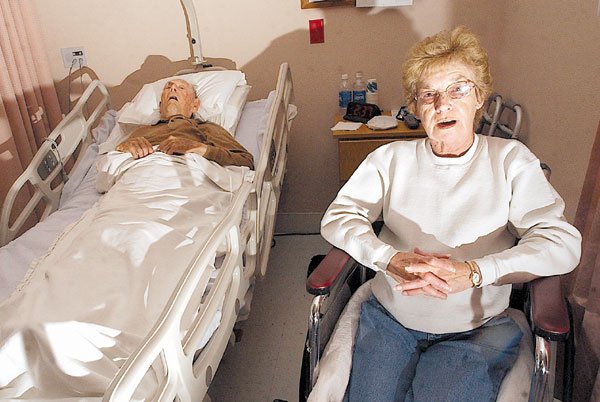It takes a certain type of person to be a full-time caregiver,
tending to the needs of someone who’s health is failing.
”
Kind, generous, caring
”
are just a few of the words used to describe Betty Ford, a
Hollister resident who has been a private caregiver for the past 14
years.
It takes a certain type of person to be a full-time caregiver, tending to the needs of someone who’s health is failing.
“Kind, generous, caring” are just a few of the words used to describe Betty Ford, a Hollister resident who has been a private caregiver for the past 14 years.
“She really became a part of our family,” said Marchel Nelson, owner of a funeral home in Hollister. Ford cared for his mother for about nine years.
“She’s a good listener, she tries to understand what’s going on with people,” Nelson said. “And it’s not a matter of dollar signs, it’s her vocation and skill.”
She was so like family, in fact, Ford was included in Mrs. Nelson’s obituary, as has happened after others succumbed to their illnesses under Ford’s tender watch.
Ford says the Nelsons became like family to her, too.
“We were close friends, as well as caregiver and patient,” she said. “We would just sit and talk. Never anything bad, though: You have to keep the bad stuff away.”
Instead, Ford, 68, speaks with her patients about their childhood, or the children and grandchildren they have.
“I love people, and I really love the elderly,” she said. “To me, the elderly are as helpless as little children. And I like working with them because I can learn about the past, how things were way back when.”
Ford’s current patient is part of a well-known Hollister farming family.
“He sits and tells me about his war years, and places he’s traveled to, and we have a laugh about things he’s done,” Ford said. “I really enjoy the one-on-one, not that I don’t become friends with everybody at the facility.”
No plans to quit
Her patient, for whom she’s cared since December, also reminisces about the days when he was more active and independent, and clearly still has an itch for farming. She recalled a recent morning when, as the two were soaking up the sun and views of the valley from the hillside outside the home, he wondered aloud whether the fields would be watered that day.
“You kind of make them feel things are getting done the way they want it to be done – even if you have no idea,” Ford said with a smile.
Part of giving patients that feeling is to let them do things on their own.
“You let them keep as much independence as possible,” Ford said. She lets her patient complete as many tasks, such as brushing his teeth, as possible. “They might be a little slower, but it’s keeping independence for them, and giving (them) some of (their) dignity back.”
When Ford moved back to Hollister about 14 years ago, she took a couple years off to help care for her grandchildren. But the itch to get back to work couldn’t keep her away forever.
“I have no plans of quitting, as long as the good Lord keeps my health,” Ford said.
But some caregivers are not put in their position by choice. Caregivers who are spending their retirement with a mother who has Alzheimer’s Disease, for example, or watching after a husband who slowly is losing his ability to care for himself. These caregivers must not only deal with the pain of seeing a loved one suffer failing health, they also might provide round-the-clock care.
During a recent support group meeting for caregivers in Gilroy, some of the roles caregivers said they found themselves filling included: cook, schedule planner and personal trainer.
Take time, care for yourself too
Dale Thielges of the Alzheimer’s Association of Northern California reminded caregivers to take the time to also care for themselves.
Some tips on managing the stress of being a caregiver, from the Alzheimer’s Association:
• Talk with other caregivers – Join a support group. The Caregiver Support Group for those caring for people with Alzheimer’s or other dementia meets every third Friday of the month in Gilroy from 2 to 3:30pm at Wheeler Manor. In Hollister, the group meets every second Wednesday, 1:30 to 3:30pm at the Hollister Community Center.
• Know what resources are available – For the caregiver’s and patient’s well-being, become familiar with care resources in the community, from adult day care to in-home assistance or Meals-on-Wheels.
• Become an educated caregiver – As diseases progress, different caregiving skills and capabilities are necessary. Learn about your family member’s disease to better understand and cope with their symptoms or behaviors.
• Take care of yourself – Or as Dale Thielges says, “Taking care of yourself is taking care of the one you love.” If possible, sleep in a different room from the person needing care. Eat well, getting plenty of fruits, vegetables, grains and protein, and avoid caffeine and alcohol.
• Exercise – One of best ways to reduce stress, even a few minutes a day of walking can be a social outlet and offer exercise. Stretching or walking in place can offer exercise for those who cannot leave the home for extended periods.
• Manage your stress level – Stress can cause physical problems and changes in behavior. Take breaks if possible, or consider hiring a health aid for some time off.
• Keep a sense of humor – Laughter releases chemicals in the body that boost health and mood. Try to find humor in difficult situations.
• Accept changes as they occur – People’s needs may change, and they may eventually require care beyond what can be provided at home.















